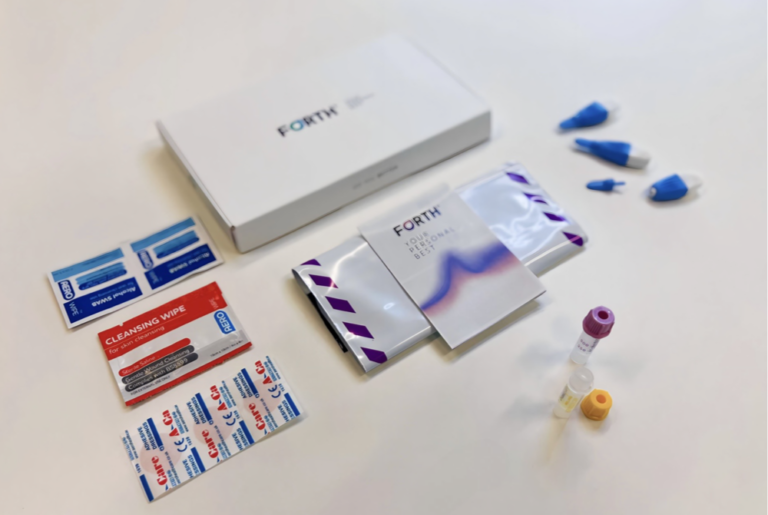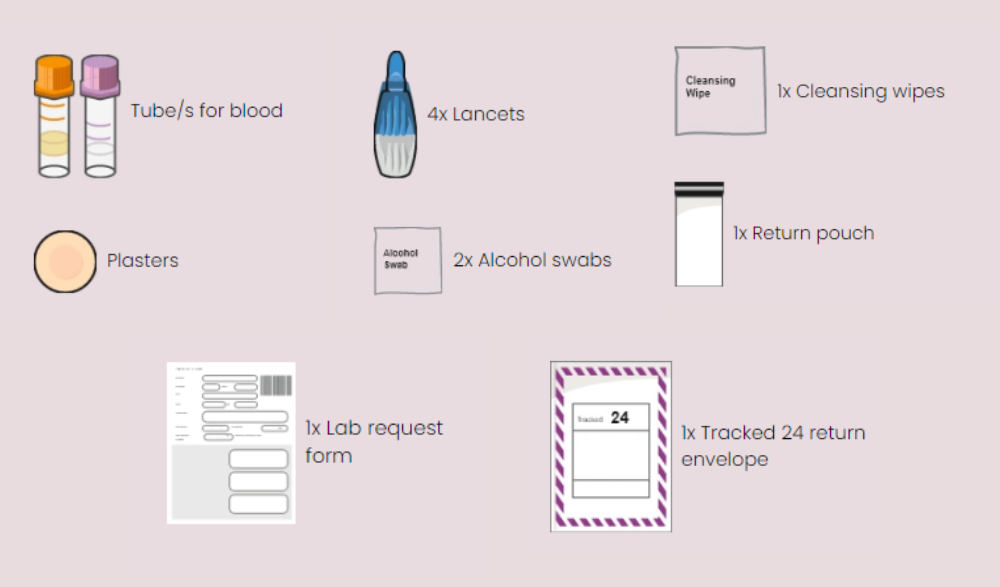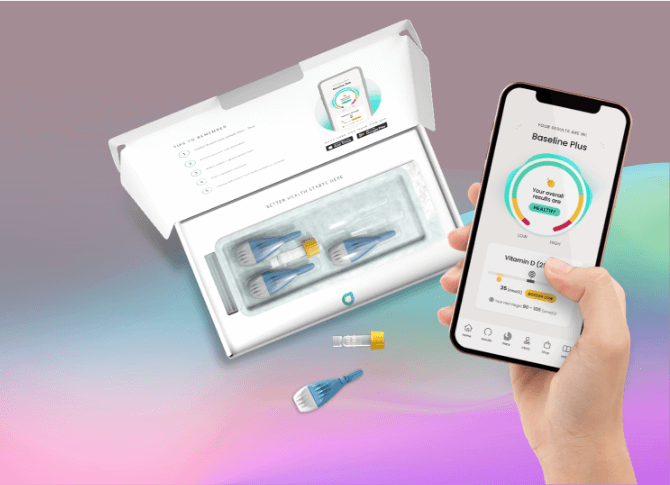9 mins read
Home Blood Tests Explained
Author: Forth
February 26, 2024
General wellbeing

Home blood tests have become an increasingly popular tool for monitoring health and wellness from the comfort of your own home. These kits provide a convenient and accessible way to obtain a comprehensive understanding of your health, without the need for a visit to a healthcare professional.
As we navigate through the world of home blood tests, we will explore the science behind these kits, the types of tests available, and the procedures for using them. We will also discuss the accuracy of these tests, the interpretation of results, and the role of these kits in managing and preventing health conditions. This comprehensive guide aims to provide a thorough understanding of home blood tests and their significance in today’s health-conscious society.
Understanding Home Blood Tests
Home blood tests are tools that allow you to collect a blood sample at home, which is then sent to a laboratory for analysis. These tests are designed to detect various health indicators across nutrition, hormones, fertility, general health and more. They are typically used as a preventative measure, allowing individuals to monitor their health and detect potential issues early.
Forth has more than 30 home blood tests covering a broad range of health areas, from cholesterol and cortisol to perimenopause and vitamins and nutrients. We also have a bespoke builder, where you can mix and match biomarkers to create a personalised blood test that checks and monitors exactly what you need to.
Our home blood tests offer a more comprehensive evaluation of your health than what you would get from your GP. By providing a convenient and accessible way to monitor health, home blood tests have the potential to revolutionise personal healthcare, without the private healthcare price tag.
Components of a Home Blood Test Kit
A home blood test kit includes several easy-to-use components necessary for the collection and transportation of a blood sample. These include lancets for pricking the finger, a small tube (or two) for storing the blood sample, alcohol wipes for sterilisation, plasters, and a pre-paid envelope for returning the sample to the laboratory.
The tests we offer are analysed at NHS labs and have all been validated for both accuracy and reliability.
The design of blood sample kits is focused on ease of use and safety. The lancet is typically spring-loaded, ensuring a quick and minimally painful prick. The inclusion of alcohol wipes and plasters ensures that the collection process is hygienic and safe.

Types of Home Blood Tests
There is a wide range of home blood tests available, each designed to test for specific health indicators. Some of the most common types include full health checks, cholesterol tests, blood glucose tests, perimenopause and menopause tests, vitamin deficiency tests, and more. These tests can provide valuable insights into your health, helping to identify potential issues and guide lifestyle changes or treatment plans.
For instance, a cholesterol test can help identify the risk of heart disease. Hormone tests can provide insights into reproductive health and thyroid function, while vitamin deficiency tests can identify potential nutritional deficiencies in your diet.
Using a Home Blood Test Kit
Using a home blood test kit is a straightforward process, designed to be easily performed without medical training. The first step is to order the appropriate test kit, which will be delivered to your home. Upon receiving the kit, it is important to read the instructions carefully to ensure that the sample collection is performed correctly.
There are 2 ways to collect a blood sample at home – using a finger-prick kit or a venous blood sample kit.
A finger prick kit involves cleaning the finger with an alcohol wipe, pricking the finger with the lancet, collecting the blood sample in the tube/s, and then sending the sample to the laboratory in the pre-paid envelope. It is important to follow the instructions carefully to ensure that the sample is collected and stored correctly, as this can impact the accuracy of the results.
A venous or phlebotomy kit has to be completed by a healthcare professional. When you order through Forth, you can choose 2 types of phlebotomy tests. One is an at-home kit, where the healthcare professional visits your home and draws your blood for you. The other is to visit one of our partner clinics and have your blood drawn there.
Both of these involve a needle drawing the blood from your vein – this is called a venous draw. Some tests can only be done via a phlebotomy kit, such as our Ultimate Health Check.
We’ve put together a detailed video with our clinical lead, Dr Thom Phillips, that shows you exactly how to collect a blood sample.
Preparation for the Test
Before performing a home blood test, it is important to prepare properly to ensure accurate results. Being well-hydrated is one of the most important factors in collecting a successful sample. We recommend you drink a large glass of water at least 30 minutes before collecting a blood sample. It is also important to avoid vigorous exercise and alcohol before the test, as these can impact the results. However, a light walk can help get your blood flowing and make it easier to collect a sample.
Some tests require your blood sample to be collected at a specific time or on a certain day. Due to the diurnal nature of some biomarkers (i.e. fluctuate during the day) some tests are best done within a few hours of waking up, such as the testosterone blood test or cortisol test, while others are designed to be done on a specific day of your menstrual cycle. Each of our tests has detailed instructions on when it is best to collect your blood sample.
Interpreting Home Blood Test Results
Once the laboratory has analysed your blood sample, the results are reviewed by a registered doctor before being sent to you via our app and online portal. These results will provide information on the specific health indicators that were tested, with your current levels, tips on how to improve and a goal for your next test.
Powered by cutting-edge technology, Forth’s app goes beyond reporting basic biomarker results and one-size-fits-all health advice to deliver a comprehensive roadmap to better health. You can view a demo report here.
It is also important to understand that home blood tests are not diagnostic tools, but rather screening tools. This means that they can identify potential issues, but cannot diagnose a specific condition. If a test result indicates a potential issue, following up with a healthcare professional for further testing and diagnosis is important.
Understanding Reference Ranges
When interpreting home blood test results, it is important to understand the concept of reference ranges. These are ranges of values that are considered normal for a particular health indicator, based on population data. If your result falls within the reference range, it is typically considered normal. However, if your result falls outside of this range (high or low), it may indicate a potential issue.
It is important to note that reference ranges are not absolute, and can vary based on factors such as age, sex, and lifestyle. Therefore, a result that falls outside the reference range is not necessarily cause for concern, but rather an indication that further investigation may be necessary. It is also important to consider trends over time, as a single result may not provide a complete picture of your health.
For example, women who are pre-menopausal will have very different hormonal reference ranges compared to a woman who has experienced menopause. To give a different example, an individual who trains hard 4-5 times a week and takes bodybuilding supplements may have elevated creatinine and/or testosterone levels.
Benefits of Home Blood Tests
Home blood tests offer several benefits, making them a valuable tool for managing your health. One of the main benefits is the ability to check, monitor and understand your health.
By regularly performing home blood tests, you can track changes in your health and detect potential issues early. This proactive approach to health can help to prevent serious health conditions and guide lifestyle changes or treatment plans.
Home blood tests empower you to take control of your health, providing you with valuable insights into your health. By understanding health indicators, you can make informed decisions about your lifestyle and healthcare, and take proactive steps to improve your health and increase your health span.
They’re also convenient. These tests can be performed at home, at a time that suits you. This makes them particularly useful for individuals with busy schedules, those with limited access to healthcare services, or those who prefer to monitor their health from the comfort of their own homes.
Complementing Traditional Healthcare
In the UK, the NHS is a ‘free at the point of care’ service for the entire population. The NHS is there to treat illness, it is not set up for preventative and proactive healthcare. Home blood tests are not meant to replace this traditional healthcare model, but rather provide the opportunity to be more proactive about your health and wellbeing.
At-home testing provides a convenient and accessible way to monitor health indicators that may otherwise be missed or ignored in the traditional NHS setting. Our tests are designed to inform and educate you about your own physiology and how it interacts with the environment we inhabit and our daily lifestyle choices.
Understanding the interplay between these three aspects is an incredibly powerful way to take control of your health and well-being from now and into the future. If you’re already battling ill health, then using at-home blood testing provides a convenient way to more regularly check your progress and can offer the support and motivation to keep making positive changes as well as guiding ongoing treatment such as monitoring the impact of HRT during perimenopause.
A greater understanding of health can facilitate more informed and productive conversations with your GP. This can lead to more personalised and effective healthcare, improving health outcomes and patient satisfaction.
Accuracy and Reliability
The accuracy and reliability of home blood tests can vary based on a number of factors. One key factor is the quality of the test kit itself. Reputable test providers use high-quality components and rigorous laboratory procedures to ensure accurate results. Forth uses the highest quality kits and NHS-accredited laboratories to ensure maximum accuracy and reliability.
Forth only works with labs that hold ISO 15189 accreditation which is the gold standard in quality for lab analysis. Forth uses NHS lab partners so you can be assured that the most rigorous processes are followed.
Conclusion
Home blood tests are a powerful tool for taking control of giving you a better understanding of your health. They provide a convenient and accessible way to monitor health indicators, detect potential issues early, and guide lifestyle changes or treatment plans. While they are not a substitute for professional healthcare, they can complement traditional healthcare services, providing a more comprehensive picture of an individual’s health.
Not everything can be tested accurately through home blood tests, however, and Forth only offers tests that have high reliability and accuracy.
By understanding the intricacies of home blood tests, individuals can make informed decisions about their healthcare, and take proactive steps to improve their health. This empowerment can lead to improved health outcomes and a greater sense of well-being, making home blood tests a valuable addition to today’s health-conscious society.
- Health scores calculated
Close
This information has been medically written by Dr Thom Phillips
Thom works in NHS general practice and has a decade of experience working in both male and female elite sport. He has a background in exercise physiology and has published research into fatigue biomarkers.

Dr Thom Phillips
Head of Clinical Services
Related articles
Like this article? Here are some more based on similar topics.




